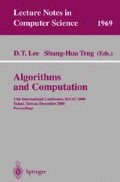Abstract
Given a set of jobs, each consisting of a number of weighted intervals on the real line, and a number m of machines, we study the problem of selecting a maximum weight subset of the intervals such that at most one interval is selected from each job and, for any point p on the real line, at most m intervals containing p are selected. This problem has applications in molecular biology, caching, PCB assembly, and scheduling. We give a parameterized algorithm GREEDYα and show that there are values of the parameterα so that GREEDYα produces a 1/2-approximation in the case of unit weights, a 1/8-approximation in the case of arbitrary weights, and a (3 - 2p2)-approximation in the case where the weights of all intervals corresponding to the same job are equal. Algorithm GREEDYα belongs to the class of “myopic” algorithms, which are deterministic algorithms that process the given intervals in order of non-decreasing right endpoints and can either reject or select each interval (rejections are irrevocable). We use competitive analysis to show that GREEDYα is an optimal myopic algorithm in the case of unit weights and in the case of equal weights per job, and is close to optimal in the case of arbitrary weights.
Access this chapter
Tax calculation will be finalised at checkout
Purchases are for personal use only
Preview
Unable to display preview. Download preview PDF.
References
G. Ausiello, P. Crescenzi, G. Gambosi, V. Kann, A. Marchetti-Spaccamela, and M. Protasi.Complexity and Approximation. Combinatorial Optimization Problems and their ApproximabilityProperties. Springer, Berlin, 1999.
A. Bar-Noy, R. Bar-Yehuda, A. Freund, J. S. Naor, and B. Schieber. A unified approach toapproximating resource allocation and scheduling. In Proceedings of the 32nd Annual ACMSymposium on Theory of Computing STOC’00, pages 735–744, 2000.
A. Bar-Noy, S. Guha, J. S. Naor, and B. Schieber. Approximating the throughput of multiplemachines under real-time scheduling. In Proceedings of the 31st Annual ACM Symposiumon Theory of Computing STOC’99, pages 622–631, 1999.
P. Berman and B. DasGupta. Improvements in throughput maximization for real-time scheduling. In Proceedings of the 32nd Annual ACMSymposium on Theory of Computing STOC’00,pages 680–687, 2000.
P. Berman, Z. Zhang, J. Bouck, and W. Miller. Aligning two fragmented sequences. Manuscript,1999.
M. C. Carlisle and E. L. Lloyd. On the k-coloring of intervals. Discrete Appl. Math., 59:225–235, 1995.
Y. Crama, O. Flippo, J. van de Klundert, and F. Spieksma. The assembly of printed circuitboards: a case with multiple machines and multiple board types. European Journal ofOperational Research, 98:457–472, 1997.
T. Erlebach and F. Spieksma. Simple algorithms for a weighted interval scheduling problem.Technical Report M00-01, Department of Mathematics, Maastricht University, April 2000.http://www.tik.ee.ethz.ch/_erlebach/Report-M00-01.ps.gz.
S. A. Goldman, J. Parwatikar, and S. Suri. Online scheduling with hard deadlines. Journalof Algorithms, 34(2):370–389, 2000.
M. H. Goldwasser. Patience is a virtue: The effect of slack on competitiveness for admissioncontrol. In Proceedings of the 10th Annual ACM‐SIAM Symposium on Discrete AlgorithmsSODA’99, pages 396–405, 1999.
D. Hochbaum. Approximation algorithms for NP-hard problems. PWS Publishing Company,Boston, 1997.
F. Spieksma. Onthe approximability of an interval scheduling problem. Journal of Scheduling,2:215–227, 1999.
Author information
Authors and Affiliations
Editor information
Editors and Affiliations
Rights and permissions
Copyright information
© 2000 Springer-Verlag Berlin Heidelberg
About this paper
Cite this paper
Erlebach, T., Spieksma, F.C. (2000). Simple Algorithms for a Weighted Interval Selection Problem. In: Goos, G., Hartmanis, J., van Leeuwen, J., Lee, D.T., Teng, SH. (eds) Algorithms and Computation. ISAAC 2000. Lecture Notes in Computer Science, vol 1969. Springer, Berlin, Heidelberg. https://doi.org/10.1007/3-540-40996-3_20
Download citation
DOI: https://doi.org/10.1007/3-540-40996-3_20
Published:
Publisher Name: Springer, Berlin, Heidelberg
Print ISBN: 978-3-540-41255-7
Online ISBN: 978-3-540-40996-0
eBook Packages: Springer Book Archive

